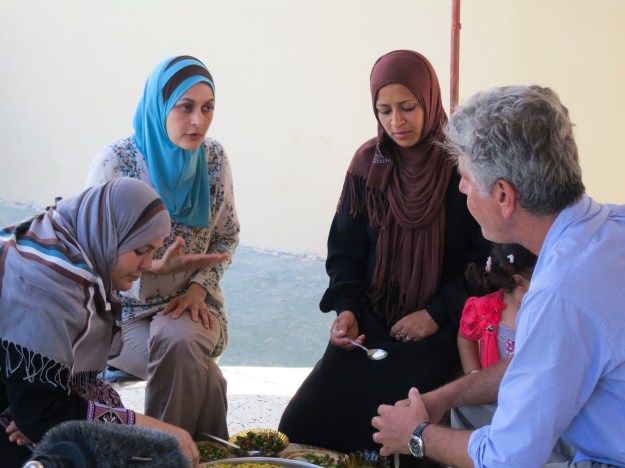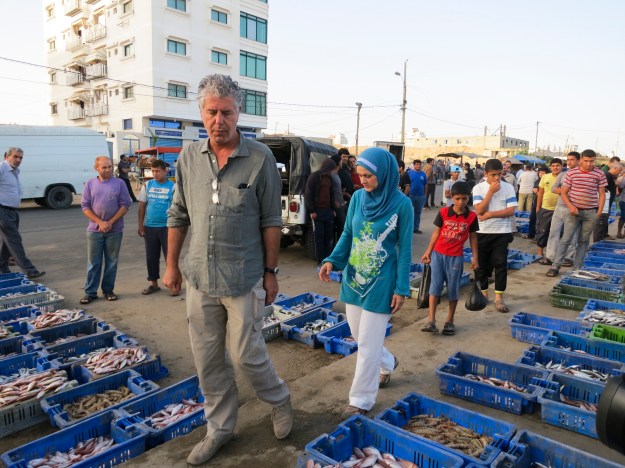I stood there on a dusty intersection of a main road in Gaza City waiting, unsure what to expect, when suddenly the convoy arrived. There was the security detail, the fixer, the producers, and the film crew. They all got out, fully miked and ready to go, and descended upon the scene like a SWAT team. I stood there flustered, unsure what my next move should be, when Tony casually emerged from one of the cars.
“I’m Tony. Nice to meet you,” he said nonchalantly, surveying the unassuming area around him.
I tried my best to act just as cool and asked what his first impressions of the West Bank and Jerusalem were, preparing for the usual rehearsed response—something implying symmetry, tragic circumstances that are the result of two peoples not getting along, or at best something along the lines of The situation is tragic, but Israel has no other recourse that I hear from so many other Western journalists.
Instead he said, “That is something seriously f****d up I just witnessed.” He said he couldn’t believe how blind, how largely unaware most Americans are of what Palestinians are going through.
And just like that we were off.
Tony’s production team had approached me about the possibility of filming an episode in Gaza more than a year before, when Tony was still with the Travel Channel. One of his producers had heard of The Gaza Kitchen, a book I was working on with Maggie Schmitt, and wanted to pick my brains for leads. At first the crew did not receive the necessary travel permits to enter Gaza; the idea to film there was resurrected nearly a year later when Parts Unknown was born.
But my involvement in the episode was not guaranteed. Traveling to Gaza for me was complicated. Though I am Palestinian and possess an Israeli-issued identity document that should grant me access to my parents’ birthplace, this access is never guaranteed. Israel places many Kafkaesque restrictions on Palestinians’ movements—even on those who, like me, live abroad. I managed to make it into Gaza days before the shoot, crossing from the border with Egypt during a small window of political calm.
We started the shoot by visiting a farming family in southern Gaza. They were overcome with joy at the prospect of a visitor whose sole interest was sharing a meal and a conversation with them. We were barely able to complete a single thought or sentence without interruption from one of the many children, cousins, husband, aunts, and so on. Members of the family scolded me for preoccupying the honored guest with too much chitchat and not allowing him to eat. This outpouring of hospitality left a lasting impression on Tony.


When Tony asked whether, given the opportunity, this family of Palestinians would want to visit Jerusalem, the husband of the family, yelled, “Give us a permit and we’d gladly go!” To the untrained ear he may have sounded angry rather than frustrated and bemused.
I broke it down for Tony, saying, “He’s not angry. This is just how we normally talk.” And we all shared a hearty laugh.
Next we made our way to a local clan, who prepared roasted watermelon with bread. We sat under a moonlit tent and ate with our hands, seated on the ground, with the clan elder.
There was one slight complication—I was traveling with my 7-month-old baby.
As we waited (and waited and waited) for the meal to be prepared, my baby was not cooperating. I was frustrated and exhausted from nursing her all day in the punishing heat, and she would not stop crying. Even the taxi driver, a father to four girls who was also keenly aware of the potential importance of such a show to outside audiences, tried his best to hush her—to no avail.
Finally Tony intervened. “Here, let me try,” he offered while we were filming. And just like that he gently rocked her to sleep. The scene made it into the final episode. His daughter was 7 years old at the time, and he later admitted, “I miss this age!” He said he took martial arts classes with her, that she was amazing, and that she’d changed his world.
Maybe this was part of the reason I was so shocked at the news of his death. He seemed to be doing so well, like he had found his footing, something to ground him. But looks, as we all know, can be deceiving.
When the episode aired, we got back in touch. I was exceedingly grateful for the opportunity to film with him and to CNN for airing the episode, as were countless others. I acknowledged my slight disappointment in the narration—the idea that this was somehow a conflict of equals and that if only people could learn to get along, things would be OK. That felt like a slap in the face to the countless communities whose rights had been trampled on and who wanted nothing more than to live in peace on their own land. He agreed and acknowledged that had it not been for this compromise, the episode would likely not have aired.
There were many small exchanges that did not make it on the air. For example, we attempted to accompany fishermen at sea, but Tony’s security detail deemed this too dangerous. They were afraid the Israeli navy might shoot at us.
Despite all of this, Tony had a way of making you feel constantly at ease. He was humble and responsive despite his larger-than-life status. Asked to blurb a book or support a cause, he was quick to oblige. He could sit with peasant or president and have an engaging, thoughtful conversation. He did something we could all learn to do a little bit better: He listened.
In 2014 the US Muslim Public Affairs Council awarded Tony its Voices of Courage and Conscience in Media award. In his acceptance speech, he said, “It is a measure, I guess, of how twisted and shallow our depiction of a people is that these [ordinary] images come as a shock to so many. The world has visited many terrible things on the Palestinian people—none more shameful than robbing them of their basic humanity. People are not statistics. That is all we attempted to show.”
Rest in Peace, Tony.
Baby Whisperer, Gourmand Extraordinaire, Humanitarian, Changemaker.